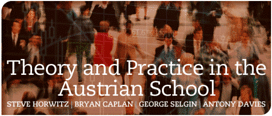Lead Essay
Professor Horwitz makes the case that the Austrian school of economics isn’t just a bunch of armchair theorists. Ludwig von Mises’s “praxeology” should not prevent and has not prevented economists from doing vital, real-world, empirical work on subjects including monetary policy, disaster recovery, communist political economy, and even piracy. Horwitz takes us on a tour of some of this work and suggests that the Austrian school can offer mainstream economics a number of vital insights.
Response Essays
Bryan Caplan argues that the Austrian school remains in general much more hostile to empiricism than mainstream economics. Austrian subjectivism is well and good, but its neglect of behavioral economics then constitutes a puzzling shortcoming. And even in the work Horwitz praises, there is little that is distinctively “Austrian”—little that necessarily relies on the distinctive methodological or conceptual apparatus of the Austrian school.
George Selgin argues that part of the disagreement at hand is semantic: Where von Mises and other Austrians used the word “economics” to denote what we now call “theoretical economics,” we need not be bound by this convention, particularly not if it tends to obscure. That said, a real disagreement remains, because many in the Austrian school have failed to grasp that a deduced theorem of economics can still be “in the (common) sense”—that is, it may still have no explanatory power over events in the real world. When such cases arrive, Selgin finds that Austrians are all too often flummoxed.
Antony Davies expresses admiration for Austrian-school economics as a “complementary approach” to the problems he tries to solve using modeling and mathematics. He finds Austrians at their most incisive in their critique of modern macroeconomics, which is based not on individual behavior, but on an “accounting identity.” He argues that both quantitative and non-quantitative methods can reveal important truths, and he suggests that Austrians should deploy the former in refuting their opponents’ theories.

